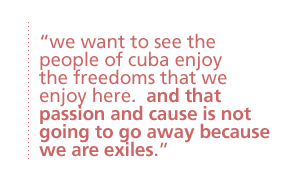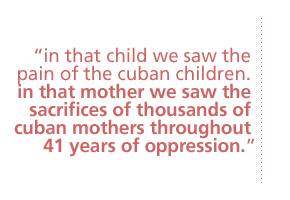

 |


She is head of Mothers and Women Against Repression in Cuba, which opposed
sending Elian back to Cuba. Members of her group conducted daily prayer vigils
near the house of Elian's relatives in Little Havana; some were present when
federal agents took Elian in the pre-dawn raid. |  |
Tell me about the day of the raid.
Our group had been there mostly the whole day. We were about to leave when the
people who were negotiating, prominent leaders of our community, talked to us
and said how hopeful they were. There were ongoing negotiations at the time
among prominent leaders of our community and the secretary of justice. We were
very hopeful that something would be determined that would insure the best
interests of this child and the family reunification. So we decided to stay,
in part to help them if they needed any help, and also to tell the crowd what
was going on and keep everything calm.
At about 5:15 a.m., we heard feet stomping, and a lot of screams. And one of
the group screamed at me and said, "Sylvia, they're coming, they're coming."
So we left the house next door to the González' family, where we had
been staying part of the time, and we rushed to the yard of the
González' family home. We came into the gate and went to the side. We
saw all the storm troopers coming in, running with long rifles, with headgear,
screaming, shoving, and pushing, and we saw them go to the door and knock the
door down. Some of us were thrown to the floors. Others were pushed. And of
course all of us were pepper-sprayed, as well as the rest of the people there.

Did you realize what was happening?
At first we didn't understand what was going on. We had been very hopeful. It
was Good Friday, and we had been told by the people negotiating that things
looked very, very well. So we couldn't understand what was going on. Then we
saw all the vans, we saw the storm troopers, and we saw all this violence. And
then we realized what was going on. I will never forget the expression of that
child as he came out the door, and the screams of that child and the cries of
that child as he was being taken by force to the van.

 There was nothing you could do?
There was nothing you could do?
No. There was nothing we could do about it. We were pepper-sprayed, we
couldn't see, we had difficulty breathing. One of the members of our group
fell onto the floor and was unconscious for some time. Her eyes rolling back,
her tongue out, and we had to carry her on our shoulders. We called 911 and we
were told that we had to carry her two blocks away to Twenty-second Avenue
because they couldn't come in. There was another baby in the same building who
also had to be rushed to the hospital afterwards because of the pepper spray,
and there was a lot of violence. With the amount of pepper spray and the
screams, it was a sight that we thought we would never see, especially on a
Good Friday, which is such an important date for the Christian religion.

Did you talk with negotiators?
Yes. Yes, we did. In fact, we talked to them, and from there we went with
them to a press conference, where they spoke at length of what had been going
on while the storm troopers came and rushed in. In my opinion and in the
opinion of everybody who was there, there were good-faith negotiations on the
part of the people here. They all wanted very much to bring this to a good
conclusion--a conclusion that would take into account the best interests of
this child.

Why were you there?
We were there mostly for the last two or three weeks in support of the child,
in solidarity with the family that had cared so deeply for this child at a time
when this child needed it so much. We were there also on behalf of this
child's mother. We were there conducting prayer vigils every day. We would
have one prayer vigil, and we would come and go. We were praying very, very
much that the family could be united without the presence of security guards
from Castro's regime or government officials. We wanted that family to be able
to come together as a family, and of course, that didn't happen.

What did you think would happen?
We had a lot of hopes for this child to have his case heard in a family court.
In fact, when we go back to all the things that happened in this case from
Thanksgiving Day, the day in which the child was found afloat in the middle of
the ocean, there was a memorandum issued by the Department of Justice through
INS that stated very clearly that the case would be decided by a family court.
What our community always advocated was not to deprive the father from parental
rights. Our community advocated for a family court to hear all sides and to
make a determination based on the best interests of the child. Apparently INS
agreed with us on its original memorandum. And what happened next was that, in
Cuba, Fidel Castro started staging orchestrated demonstrations and making
demands to this administration. And then it was an administrative decision and
not a family court matter.

You saw Castro's hand in this?
Yes, of course. This is not a normal custody case, because Cuba is not a
normal country. I still have yet to find someone willing to assert that Cuba
is not under the yoke of a totalitarian dictator who controls every aspect of a
Cuban's life, including children. In our opinion, the father could not speak
for the child, because Castro was speaking for the father.
In Cuba, children's rights, at best, are limited. From the time a child is
born, he's at the whim of the state. From early childhood through their teens,
they are indoctrinated at school, brainwashed. They are made to belong to a
group where they are encouraged to denounce their parents and their families if
they do not agree with the official doctrine of the communist state. They are
sent in their teens to fight battles and wars, communist wars, far away from
their families. They're also sent to farms very far away from their families
to work in labor camps.

 Is it possible that Elián's father really wants him to return to
Cuba?
Is it possible that Elián's father really wants him to return to
Cuba?
Yes. There is that possibility. I don't think so, but there is that
possibility. That is why it was so important for a family court to have heard
all the sides to be able to ascertain the truth. INS says that, because they
interviewed the father twice in Cuba, they felt satisfied that the father was
saying the truth. We have reports to the contrary. Some reports are accounted
by people who knew the father before, that the father knew that the child was
leaving with his mother, that the father wanted also to leave Cuba. Now what
happens? Everybody who dares to speak different to Fidel Castro or to what the
regime wants to hear in Cuba is either incarcerated, executed, or sent into
exile. Once Castro took control of this situation, the father could no longer
speak on behalf of that child.
The fact that the father did not come--the fact that five months went by
without the father coming to Miami to see his son--tells a lot, in my opinion,
about who controls what in Cuba and who controls the father. Any normal father
would have immediately come to be by his son's side. And even this father, in
a taped interview . . . said that he had lost nothing in Miami that he had to
come for. The only thing he had in Miami was his son. And if he had been free
to do what any normal father would do, he would have immediately come here.

Did the non-Cuban community understand the meaning of Elián's
story?
It is very difficult for those of us who have the privilege to live in a free
society to begin to understand what went through Elián's mother's mind
when she made this desperate attempt. What would make a mother risk
everything--her life and the life of her children--to give them a chance at
freedom? It is very difficult unless one has experienced it and one knows what
it is.
But for us, Elián symbolizes the pain of the Cuban family--the Cuban
families that, throughout 41 years of oppression, have been divided by one man
and one system. It is still fresh in our minds; all the testimonies of the
witnesses that saw their children drown at the hands of Castro's gunboats on
March 13, 1994. These people, under the orders of that regime, took children,
including a three-month-old baby, from the mothers' arms, and threw them into
the dark sea at night. It is very difficult to understand, but in south
Florida, we've seen many images. We've heard many testimonies of many crimes
committed against the Cuban family by this man.

What was the silent non-Cuban majority thinking?
Many of them did not know the reality of parental rights. If you tell me that
a mother of a child dies and there's a surviving father, and ask, "Who is
entitled to have the custody of that child?" It's black and white. I will
tell you, "Yes, the father is entitled, all other things being equal."
But there were so many things here that were not normal, that were not properly
explained or given the opportunity to be explained. The circumstances were not
the same as any normal custody case. And that is why we felt so strongly that
the child needed a day in family court where the father could come and assert
his rights. We are turning this child over to the custody of Fidel Castro and
the regime. Not to the father, but to Fidel Castro and the regime. At least
when the child was here, the child could be visited by a lot of people. Over
there, not even the family that cared so much for the child here has been
allowed to visit this child.

People are impatient.
We live here, but we were forced to come here by the circumstances in our
homeland. We are very grateful to this country and we have raised our families
here, and we have made significant contributions to our community. However, we
have a cause, and we have a passion. We want to see our homeland and the
people of Cuba enjoy the freedoms and the rights that we enjoy here. And that
passion and that cause is not going to go away because we are exiles. We came
here; forced because our parents didn't want us to be brainwashed in what was
happening in Cuba. Many of us have come into exile. Two million. Two million
Cubans came into exile. But we have a cause, and we feel very strongly about
that cause. That cause is what any people in any free society wants, which is
freedom, which is fundamental rights, which is justice. None of those are
existent in Cuba, and we will continue the struggle until we see the people of
Cuba enjoy those freedoms and those rights.

What was the hope?
There was an agreement that had been already signed by the González
family here, whereas the parties would agree to live in a private compound, the
same compound, separated, so there could be a family reunification that would
insure that the best interests of the child would be paramount.

But if Elián's father didn't want that?
Then it would have been that decision. It would have given way to the
resolution of this matter in a much better way than what happened with that
raid that night, and that violence, and forcing that child to leave that home
that way, with so much emotional distress. I really believe that it would have
been the family reunification. They would have been able to come together as a
family, and I really believe that that would have been a resolution that would
have taken into consideration the emotional well being of the child and the
child's best interests. Whatever happened, we would have abided by that, and
we will abide by the rule of law also. But it would have been the right path.
Here we had a lot of pressure coming from Fidel Castro and the regime in
Havana, and here we have in this administration a policy of appeasement with
the Castro regime. And in the midst of all this, there were good-faith
negotiations going on. Why the raid? Why the violence? Why not do it the
most prudent way for that child?

Why was it so traumatic to the Cuban-American community?
Because in that child, we saw the pain of the Cuban children. Because in that
mother, we saw the sacrifices of thousands of Cuban mothers throughout 41 years
of oppression. Because we saw in this case the family division that this
system and this dictator has instilled in our homeland. We saw all the pain
and all the suffering of 41 years, and it became a very good thing for us. The
suffering is still going on. The pain is still being inflicted. And this
child represented all that pain, all that suffering, and all those things that
have been done to my people and to my homeland for 41 years.

home · analyses · interviews · timeline · discussion
video excerpt · links · readings · synopsis
tapes & transcripts · press · credits
frontline · wgbh · pbs online
web site copyright WGBH educational foundation
top photo © afp/corbis
 |  |